Co-owner and winemaker of Château Beauséjour Duffau-Lagarrosse: “I do not believe that the land belongs to us”.
The 20th interview in Le Figaro Vin’s series takes us back to Bordeaux, where Joséphine Duffau-Lagarrosse, #31, maintains her family legacy at Château Beauséjour, Premier Grand Cru Classé B de Saint-Émilion. With her impressive maturity and depth of insight, she ranks among the most talented winemakers of her generation.
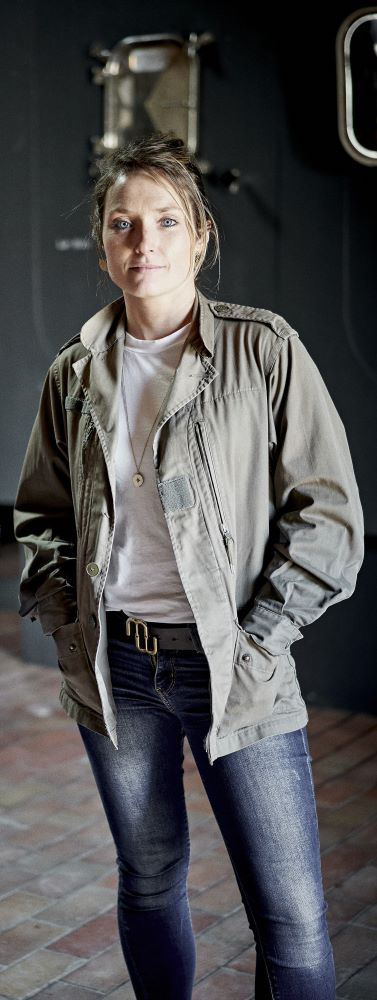
Her seven-hectare estate, in the iconic Right Bank appellation of Saint-Émilion, boasts an exceptional limestone plateau terroir. The vineyard is planted with rows of Merlot and of Cabernet Franc, which produce wines of extraordinary vivacity.
Having been passed down the generations since 1847, Château Beauséjour underwent a tumultuous sale in 2021. It now belongs jointly to Joséphine Duffau-Lagarrosse, 33 – the last of the family remaining at the Château – and Prisca Courtin, 35, granddaughter of Jacques Courtin, founder of Clarins. Joséphine draws to good effect on her ten years’ experience on estates ranging from Burgundy to Mexico, by way of New Zealand, and finally to Bordeaux, notably with Bernard Magrez. Today she oversees the production of her estate’s wines with great panache, supported by two renowned consultant oenologists, Axel Marchal and Julien Viaud.
Le Figaro Vin: How does it feel to be crowned a winemaking champion?
Joséphine Duffau-Lagarrosse: If that is how you regard me, then I feel a degree of pride!
Have you been training for long?
Yes, for quite some time. My grandparents on both sides were great wine connoisseurs. They were a formative influence from my earliest years and had me tasting well before I came of age. I have deep aromatic memories that underpin my keen sense of smell and taste. My nose has been practising for a long time. As far as vinification is concerned, there is only one vintage per year, and each one is different. We always tell ourselves that we will do things differently next time. So every year involves further training.
Who is your mentor?
Axel Marchal and Julien Viaud (who embody the new generation of consultant-oenologists in Bordeaux, ed.) are part of my team. They challenge me but their job is not, strictly speaking, to mentor me. I would suggest, rather, that nature is our mentor. From one year to the next, we have to aim higher.
Is wine a team sport?
Yes, very clearly, because wine starts with the vines, and I am not on my own in the vineyard. Some members of my team have been at Beauséjour for 30 years, and without them – Izilda and Christophe – it would be difficult. They bring their own insights and their deep familiarity with the property. To give some context, Izilda’s parents were originally hired by my great-grandparents. As for the vinification, I have Axel Marchal, Julien Viaud, and Camille de Villenaut to support me. We challenge each other and move forward as a team!
What is the key to making a good wine? The terroir or the winemaker?
That’s a really tricky question. When you have a great terroir, if the winemaker makes a mistake, in terms, it is the terroir that can rectify the situation. On the other hand, a good winemaker might make something fantastic from a poor terroir. But, if I have to decide, the terroir comes out on top.
To what do you owe your success?
It’s partly a question of upbringing, which I owe to my family. They taught me the value of the land and of hard work. As for the success of Beauséjour, that is down to meeting Prisca (Courtin, President of the Clarins Group’s Oversight Committee, ed.) who believed in our project. My upbringing has enabled me to follow through on our acquisition, and to persevere in the face of stressful conditions.
Are your parents proud of you? And is your dog?
Yes, I think so. My dog Tokaj is too, and happy to spend every day here at Beauséjour.
Who is your biggest supporter?
Prisca Courtin.
Your favourite colour?
Blue.
Your favourite grape variety?
Cabernet Franc.
Your favourite wine?
I love Domaine de Vaccelli’s Granit. It is the wine which, in a blind tasting, I always place in Burgundy, even though it’s from Corsica!
Your favourite vintage?
1990 (the Beauséjour vintage which has acquired legendary status and the year that Joséphine was born, ed.).
If your wine was a person, who would it be?
Someone with quiet strength who opens up over time.
What are the best circumstances in which to taste your wine?
Over a good meal, with a delicious piece of meat, and with friends.
Have you ever thought about chemically enhancing yourself, or your wine?
Never.
For what price would you be prepared to sell your estate?
I do not believe that the land belongs to us. My grandfather used to say – and my father would repeat it – men pass through while the terroir remains. I cannot sell what isn’t mine. So I will never sell, not for any price.
Who is your strongest competition in Saint-Émilion?
That’s rather a loaded question. We are often told that we are the next Ausone. In terms of terroir, I believe that to be true.
Which competition do you dread the most?
I don’t feel as though we are in a competition with our neighbours. If all the Saint-Émilion Grands Crus perform, that has an international reach. I don’t have the competitive streak. Contrary to what people might think, we do not compete with each other in Saint-Émilion, we compete for our appellation’s international ranking. I check out the ratings of my neighbours’ wines, of course, but you have to behave in the right way. If our neighbours, like Bécot, Canon, Angélus etc., were to come to us tomorrow asking to borrow some equipment, then of course we would help them out.
What are you most proud of?
The revival of Beauséjour.
What has been your most innovative strategy in the vineyard and in the cellar?
There have been technical innovations, of course, but I feel there has been a return to common sense. My most innovative strategy has been to refocus on observation and intuition. We have gone through a phase which has brought in a mass of technology, like measuring probes, and infrared. We have also learnt that innovation is not the answer to everything. We need to get back to the basics.
Who would be your ideal successor on the podium?
It would be someone with common sense, humility, and an open mind.
Cellar Master of Champagne’s oldest house: “I see myself as a craftsman”.
For the 19th interview in Le Figaro Vin’s series, we pay our third visit to Champagne to meet Frédéric Panaïotis, #32, chef de caves of Maison Ruinart for the past 16 years. He is now, beyond question, one of the most influential figures in Champagne, fashioning wines of outstanding precision and purity from every vintage.
Though always at home in the world of wine – his grandparents owned a small winery – his original ambition was to be a vet. However, a seminal encounter with a great Burgundy set him on a different path: after graduating in agronomy he became an oenologist, cutting his teeth in California before working for 12 years at Veuve Cliquot. He then joined Maison Ruinart in 2007, going on to become one of the most inspiring chefs de caves of his generation.
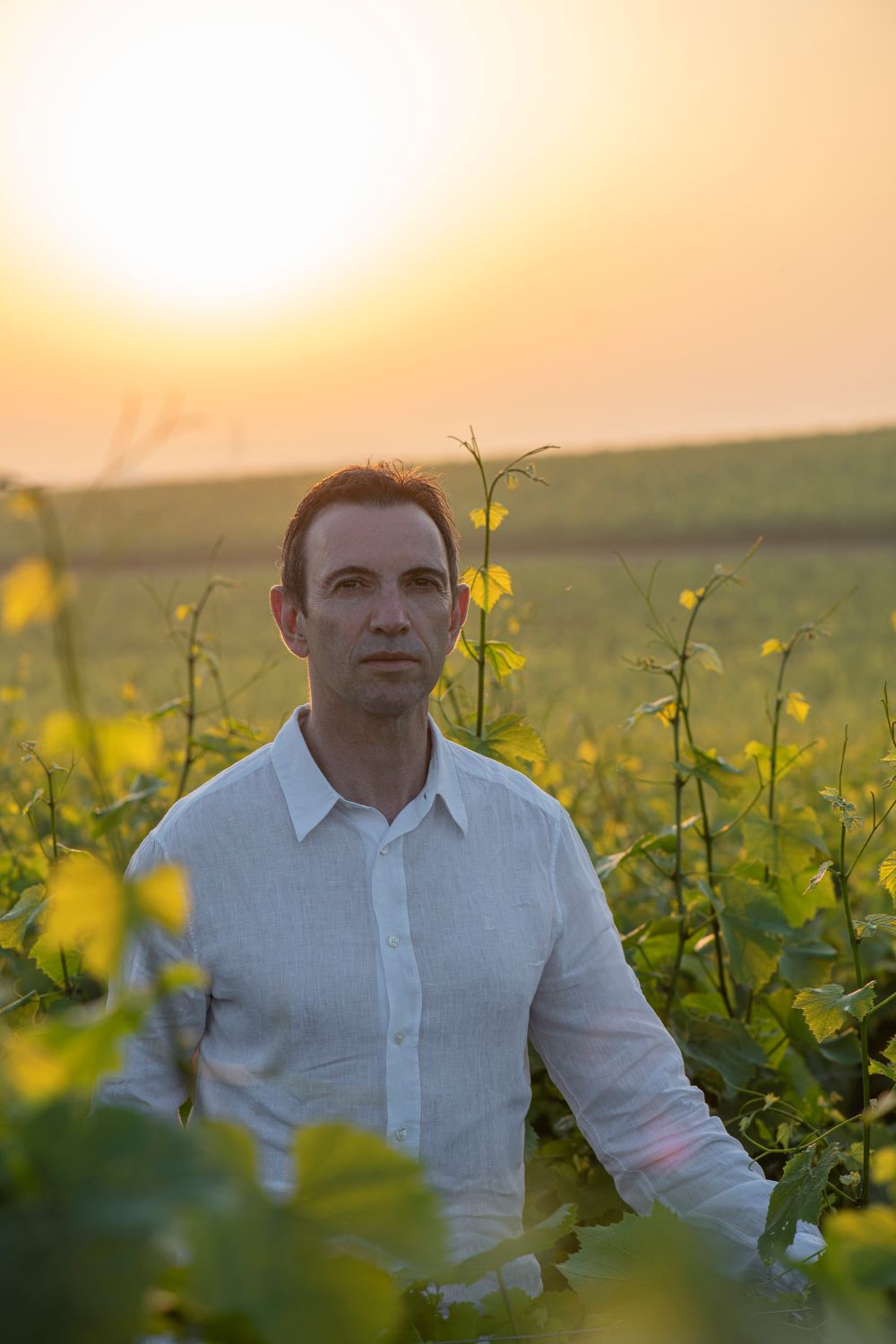
Le Figaro Vin: How does it feel to be crowned a winemaking champion?
Frédéric Panaïotis: That’s something to celebrate, isn’t it? It calls for champagne! And a Blanc de Blancs would be perfect. More seriously, my congratulations go, first of all, to the entire team that works alongside me.
Have you been training for long?
For 39 harvests (make that 40 including one in New Zealand in 2001!).
Who is your mentor?
I would say there are two of them: on the one hand the natural elements, especially the climate which sets the tempo, and on the other, Frédéric Dufour, President of Ruinart, who keeps challenging me and is always driving us forward.
Is wine a team sport?
Completely. Wine is always the product of the collective effort of talented men and women, from the vine all the way through to its development and its launch. And we really do have a mixed team at Ruinart, with genuine parity, specifically in our winemaking team.
What is the key to making a good wine? The terroir or the winemaker?
If your definition of terroir includes the selection of grape varieties and the way the vines are trained, in addition to the climatic elements and the soil – and that is how I see it – then the terroir is indisputably the foundation for making great wines.
To what do you owe your success?
To a combination of passion for the world of vines and wine, a lot of hard work, and also the good fortune to have been in the right place at the right time…but as the saying goes, “God helps those who help themselves!”.
Is your family proud of you?
I hope so! Whether on earth or in heaven…In any case, as far as my nearest and dearest are concerned, they appear to enjoy our wines. And naturally, that allows them a touch of pride.
Your favourite colour?
Sea blue.
Your favourite grape variety?
Chardonnay, of course!
Your favourite wine?
Dom Ruinart Blanc des Blancs.
Your favourite vintage?
2010, while awaiting 2019.
What are the best circumstances in which to taste your wine?
Always among friends, because I cannot imagine opening lovely bottles without sharing them. And sometimes it only needs two of you!
Have you ever thought about chemically enhancing yourself, or your wine?
To be honest, I’m more the sort of person to implement anti-doping controls. So the answer is no, never.
For what price would you be prepared to sell your estate?
Maison Ruinart doesn’t belong to me, and in any case, I don’t believe it’s for sale.
Who is your strongest competition?
Rather than a competition, I prefer to think of it as a rivalry among those who are, in many cases, good friends. This means we are always looking to improve, aspiring to excellence. Nothing beats rivalry for making you test your limits and give it your all!
Which competition do you dread the most?
The next harvest, because you never know what it will bring. And in the longer term, climate change, which will affect us more and more profoundly. We are going to have to get to grips with it and reinvent ourselves, which is what we have started to do with our new wine, Blanc Singulier.
What is your greatest trophy?
The title of Supreme World Champion, awarded by the CSWWC (Champagne and Sparkling Wine World Championship) in 2022 for Dom Ruinart Blanc de Blancs 2010, because it represents the culmination of a project begun by my predecessors in 1998, which involved trialling tirage under cork. I was lucky enough to inherit this project and see it to fruition.
But the best reward comes through conversations and shared moments with our customers when they have enjoyed tasting one of our champagnes.
What has been your most innovative strategy in the vineyard and in the cellar?
I see myself more as a craftsman than an artist or a researcher. So my strategy is to try to evaluate and understand in minute detail every step from the vine to the wine. The aim is to replicate, and where possible enhance, what we already do. I am not sure that is a very innovative strategy, but it does help us improve!
Who would be your ideal successor on the podium?
Ask me the same question in six years’ time, in 2029, when we celebrate the 300th anniversary of Maison Ruinart!
Owner and winemaker of his family estate in Jura: “Thirty years ago no one believed in Jura wines”.
The 18th in Le Figaro Vin’s series brings us to the Jura, a growing force as a wine region, to meet Jean-François Ganevat, #33, who ranks among the most successful and respected natural winemakers in France. He creates his exquisite wines, which are increasingly prized and hard to get hold of, at Domaine Ganevat, in the hills of Rotalier.
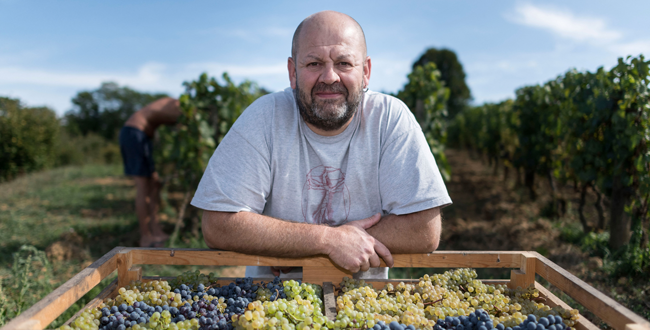
Le Figaro Vin: How does it feel to be crowned a winemaking champion?
Jean-François Ganevat: That is always great news. It makes me blush, because I don’t make wine to win medals, but I am delighted by all the excitement around natural wine and by the fact that real aficionados are happy to drink ours. Thirty years ago no one believed in Jura as a wine region, and the great majority of our wines were sold in Franche-Comté. Today we sell wine in 63 countries!
Have you been training for long?
For 14 generations. I have been immersed in it since I was a little boy, and I don’t know how to do anything else.
Who is your mentor?
I have mentored myself. We were introduced to Pierre Overnoy’s wines as children, but when we tasted them, we didn’t understand them. I still remember his visit to our school, and we thought his wines tasted revolting! It was quite some time before I got it, and it was my encounter with Didier Barral, in Languedoc, that really opened my eyes.
Is wine a team sport?
Of course, because to get good grapes you have to work the land, and you need manpower to do that. The term “organic” is meaningless if everything is mechanised. You need an authentic terroir, a philosophy, and a know-how to impart.
What is the key to making a good wine? The terroir or the winemaker?
It’s a combination of things, but a winemaker must know how to get the best from his terroir.
To what do you owe your success?
To my ancestors, because we are lucky enough to come from a family that has always pampered its vines.
Is your family proud of you?
I hope so. My father died in 2018, and he had already taken in how much progress we had made with the estate, in relation to the vines as well as the wines. He would have been proud today. There is no standard instruction manual for the winemaker’s profession, you learn something new every day. After 40 years I still don’t know what I will be doing tomorrow.
Your favourite colour?
I love the Jura reds. They have unbelievable drinkability and have really made a name for themselves.
Your favourite grape variety?
Savagnin for white wine and Poulsard for red.
Your favourite wine?
I really cannot answer that question because I am constantly being surprised.
Your favourite vintage?
2018, because the wines had real warmth, combined with high yields. Though when I tasted them as young wines, I found them thin and watery, with a sugary and not very aromatic aspect. A long period of maturation has produced an amazing patina and resonance.
If your wine was a person, who would it be?
The person who made it.
What are the best circumstances in which to taste your wine?
A wine should be tasted outside, and you should take your time over it. It should be drunk by people who are down-to-earth, because, as I always say, I want to make good wines, not grand wines.
Have you ever thought about chemically enhancing yourself, or your wine?
The more time goes by, the better you get to know your vines. I don’t need anything else. You have to learn how to discover your wine, and the wine learns to discover itself.
Who is your strongest competition?
Fear of frost, that’s what makes us sweat every year, because we no longer have proper winters.
Which competition do you dread the most?
The month of April.
What is your greatest trophy?
Recognition, from those who didn’t necessarily believe in me when I started out. However, from the beginning, I have been making the wines that I want to drink myself.
What has been your most innovative strategy in the vineyard and in the cellar?
Trust. I pamper my wines, and then the less I interfere with them the better things turn out.
Who would be your ideal successor on the podium?
I pass the little I know on to young colleagues who are just becoming established, who represent the future. A good wine is a complex of overlapping details. I would love to pass on my passion to my son, but he is only ten!
Owner of his family estate in Corsica and winemaker: “I was never any good as a conventional winemaker!”
The 17th interview in Le Figaro Vin’s series finds us in southern Corsica, where the luxuriant plots of Domaine Comte Abbatucci lie nestled in the heart of the Taravo Valley. We are here to meet Jean-Charles Abbatucci, #34, the island’s undisputed champion of biodynamic viticulture.
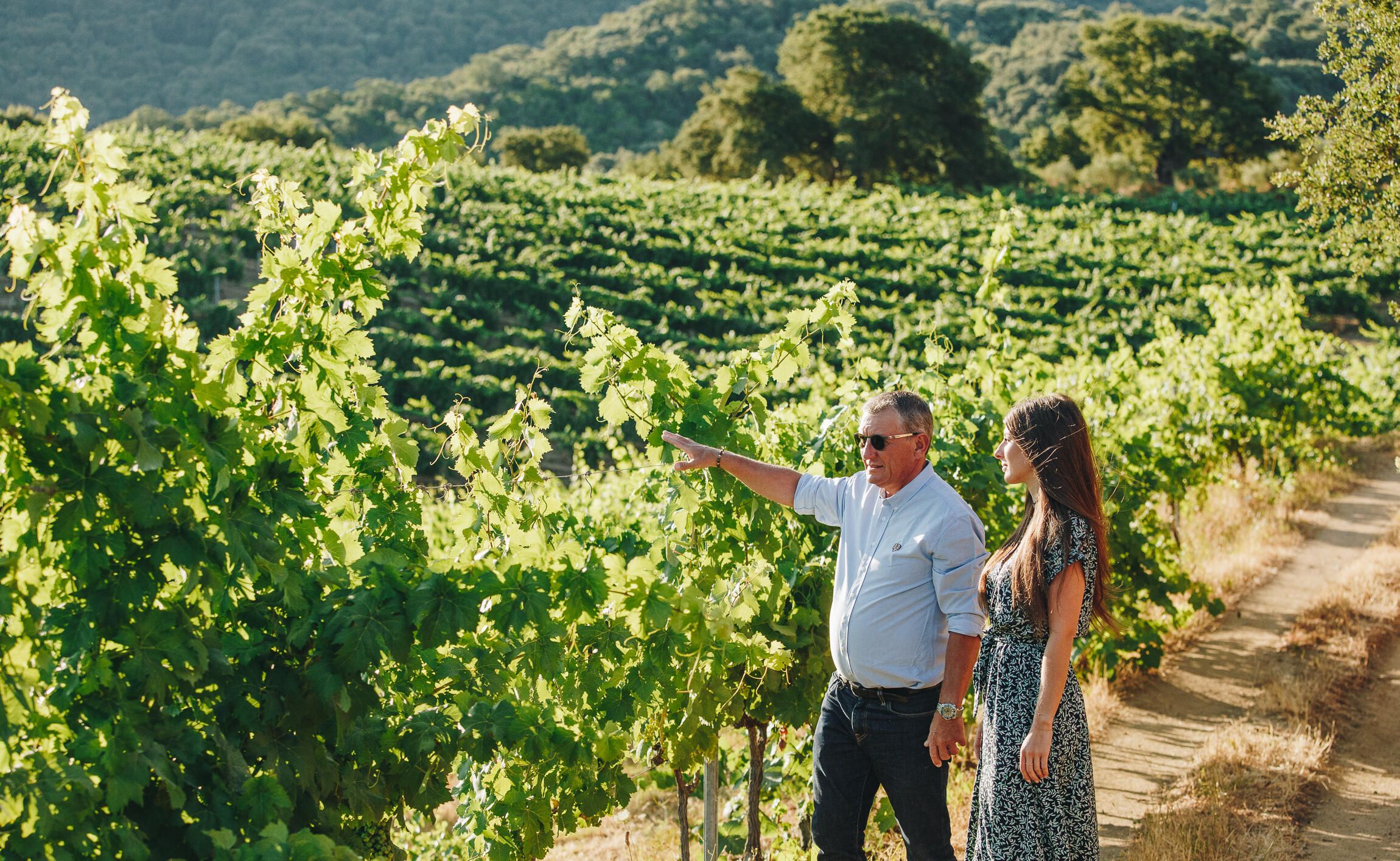
Domaine Comte Abbatucci is a living ampelographic museum of the Corsican wine region, with no fewer than 18 grape varieties grown alongside each other. With his hat firmly in place, and a pair of sunglasses hiding the twinkle in his eyes, the legendary winemaker that is Jean-Charles Abbatucci has acquired, over the course of many vintages, an encyclopaedic knowledge of all aspects of biodynamic viticulture. This knowledge extends from its history to its philosophy, with a dash of the esoteric.
While he describes himself as a pragmatist, he is constantly trying out new approaches, the most striking of which remains the treatment of vines with seawater. In the cellar, the wines range from those bearing the stamp of an outmoded nobility, from Ministre Impérial to Général de la Révolution, through to the cuvée named Faustine, after his daughter, available as a red, a white, and a rosé. Now a member of the Académie du vin de France, Jean-Charles Abbatucci embodies both the memory and the future of Corsican winegrowing.
Le Figaro Vin: How does it feel to be crowned a winemaking champion?
Jean-Charles Abbatucci: In my opinion being a champion is, above all, about giving expression to your terroir and to your grape varieties. It’s a particular vision of agriculture and the winemaker’s vocation.
Have you been training for long?
Yes, for 30 years now. When I started out, I was pretty conventional, doing what I could with the means at my disposal. But I was never any good as a conventional winemaker! One day, after ten years, something just clicked. This brought about my transition to organic and biodynamic agriculture, and the results of that transformation are what have made me a champion.
Who is your mentor?
From the 2000s onwards my mentor has been nature. When you take a step in her direction, she takes ten towards you. She can be capricious, admittedly, but then we are too. You have to be able to deal with that, assess the situation, and challenge yourself.
Is wine a team sport?
Yes, of course. The more you are a champion, the more you need a strong support team. Ultimately it is the athlete or the winemaker that lifts the trophy, but, behind the scenes, the winemaker benefits from the different perspectives that can be provided by an oenologist, a vineyard manager, etc.
What is the key to making a good wine? The terroir or the winemaker?
It is all of them together. I believe that there is an alchemy between the terroir, the winemaker, and nature.
To what do you owe your success?
In my case, to my father who was responsible for the preservation of the historic Corsican grape varieties. If he hadn’t been inspired to collect them, I wouldn’t be where I am today. But I must also acknowledge that I am fortunate to enjoy an exceptional terroir and a wonderful island.
Is your family proud of you?
Yes, they are all very proud. I have a very close working relationship with my brothers, one of whom is a restaurateur, the other a farmer. We are always bouncing ideas around.
Who is your biggest supporter?
It has to be nature, yet again. She gives me everything, not least the traditional Corsican grape varieties.
Your favourite colour?
Red.
Your favourite grape variety?
Sciaccerello. It’s a grape that provides unbelievable results when you know how to work with it, a kind of wild Pinot Noir, which displays finesse, elegance, and an aroma suggestive of myrtle and immortality. I also incline towards Carcajolo Nero, a variety that is highly characteristic of Corsica. I really struggle to choose between the two.
Your favourite wine?
For now, the one which truly stands the test of time remains Ministre Impérial, but the one which most fully expresses Carcajolo Nero would be my Cuvée Valle di Mare (vinified since 2019 and produced from vines treated with seawater, ed.).
Your favourite vintage?
2017 is a really lovely vintage. It was a temperate year which provided outstanding wines.
If your wine was a person, who would it be?
My wine personifies Corsica.
What are the best circumstances in which to taste your wine?
At any time, around a meal. It is a wine for epicures.
Have you ever thought about chemically enhancing yourself, or your wine?
No. I did it in my early days before I realised that it doesn’t work.
For what price would you be prepared to sell your estate?
It is priceless.
Who is your strongest competition?
The weather. You can lose a bit at every stage, and you can never get it back. In the end, you count your losses, and then you have to let them go. But if it’s my enemy, it’s also my life. It is an alchemy of both these things.
Which competition do you dread the most?
The two most critical months are May and June. That’s when we have to be on a war footing, especially when, like me, you work without a safety net.
What is your greatest trophy?
Being appointed to the Académie du vin de France, that is very special. It is in recognition of my work, but also for Corsica, as I am the first member from our island. That has taken some time, when you consider that Corsica has been a winegrowing region for over 3,000 years!
What has been your most innovative strategy in the vineyard and in the cellar?
Treating vines with seawater. That is what has made me stand out from the crowd. I think we will hear more and more about these wines. In my opinion, they belong among the new wines of the 21st century. A number of winemakers are becoming interested in the concept, but the precise principle and formula are mine.
Who would be your ideal successor on the podium?
My daughter Faustine, who will take over the estate.
Fifth-generation winemaker of this renowned family estate: “My first internship supervisor was Aubert de Villaine, of Domaine Romanée-Conti”
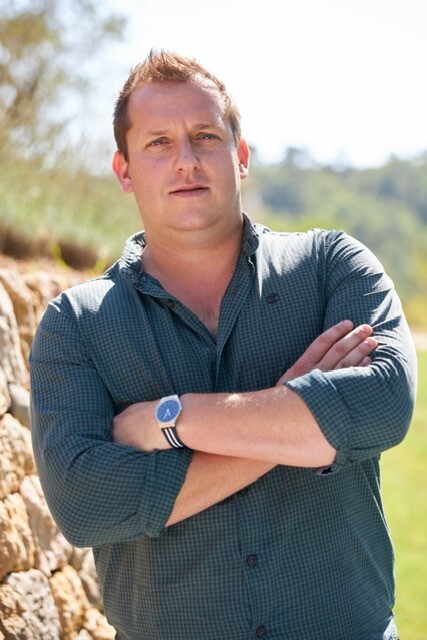
For the 16th interview in Le Figaro Vin’s series we head south down the Rhône Valley to one of its finest appellations, Châteauneuf du Pape, where we meet César Perrin, #35. Vintage after vintage he and his family devote themselves to their labours with total commitment.
An Eden in the Rhône Valley, surrounded by hills, vines, and olive trees, Château de Beaucastel is widely recognised as one of the most inspiring estates in Châteauneuf du Pape. While its origins date back to the 16th century, it was in the early 1900s that Pierre Perrin took it over. His son Jacques proved to be a true master of the winemaking craft, capable of taming the wilfulness of Grenache, while his innovative spirit led to the estate’s early adoption of biodynamic viticulture at the start of the 1970s. Today César is part of the fifth generation to carry the torch, alongside eight other members of his family, made up of his parents, uncles, brothers, and cousins. Through each successive vintage we have found ourselves utterly enchanted by the supple grace of their reds, perfectly balanced between the intensity of the fruit, the smoothness of the tannins, and an aromatic complexity which just keeps on growing deeper.
Le Figaro Vin: How does it feel to be crowned a winemaking champion?
César Perrin: I don’t think of myself as a champion. We are, more than anything, champions for our generation, continuing the achievements of our parents, grandparents, and great-grandparents before us. We have to be champions in preserving and passing on our inheritance, for we are all just passing through. It is always gratifying to know that our wines are tasted all around the world.
Have you been training for long?
Winemaking is a vocation, so we all devote a great deal of time to it, much to the detriment of our families. We train every day from a very young age. Whether in the cellar, among all the smells, or playing Le Nez du Vin and trying to recognise the fragrances, it is a little like The Drops of God. Already with my daughters, aged three and two, we taste different fruits, such as unripe cherries.
Who is your mentor?
I would say my father, who initiated us. Apart from him it would have to be my first internship supervisor, Aubert de Villaine, in 2008. He told me something that has always stuck with me: “Here at Romanée-Conti, no matter what your task is, whether it takes you an hour, or a day, or a month, you have to do it perfectly.” Ever since, I have tried to do my best on a daily basis.
Is wine a team sport?
It is for me, but most importantly wine is made to be shared and is, in that respect, a team sport. Wine is, above all, a moment for sharing, a shared emotion. You can go fast on your own, but together you go further.
What is the key to making a good wine? The terroir or the winemaker?
A great wine requires four elements: the terroir, the vine selected for planting, the climate that supports it, and the man who tends that vine. It is a combination of the four.
To what do you owe your success?
To my grandfather Jacques and my grandmother Marguerite, who turned Beaucastel into a jewel. They were pioneers, going organic in the 1950s and biodynamic in the 1970s. In rejecting the incursions of chemistry they were true visionaries.
Is your family proud of you?
I hope so. In any case, that is the great benefit of working as a family: we are very candid with each other and there is a real honesty between us. That only adds to the pressure and makes it even more imperative that we ensure our family can be proud to represent our wines.
Who is your biggest supporter?
Château de Beaucastel Châteauneuf-du-Pape Hommage à Jacques Perrin, which is our finest wine.
Your favourite colour?
Red.
Your favourite grape variety?
Mourvèdre. My grandfather was very fond of it. The grape variety was introduced to Beaucastel in the early 1930s. My grandfather went to school with Lucien Peyraud of Domaine Tempier, which is still, in my view, the greatest of the Bandols. I have noticed that the great Bandol wines were always made in the northernmost part of that appellation, while here in Châteauneuf we are at the northern boundary of our appellation. That explains why we brought Mourvèdre, which is an archetypal Bandol grape variety, to our own terroirs.
Your favourite wine?
Our whites. We have relatively very few of them, only eight to ten per cent of our production. But our Roussanne Vieilles Vignes is my favourite.
Your favourite vintage?
My first, 2012.
If your wine was a person, who would it be?
It would be a countryman.
What are the best circumstances in which to taste your wine?
With friends.
Have you ever thought about chemically enhancing yourself, or your wine?
No, quite the opposite, we have to preserve the distinctive quality of each vintage, and take what nature gives us. Nature is not always congenial, but it is what it is.
For what price would you be prepared to sell your estate?
Everything has a price, apart from family. So the question will never arise, since we want to pass it on forever.
Who is your strongest competition?
The weather.
Which competition do you dread the most?
Pruning the vines, which is such a key moment in their development.
What is your greatest trophy?
My grandmother’s pride. When she made family meals, she used to say to us: “When I am gone there is a case of wines with vintages made by me and your grandfather. I want you to open it together.” They were old magnums from 1950 and the family drank them together. It was a uniquely special experience.
What has been your most innovative strategy in the vineyard and in the cellar?
That goes back to my grandparents, with their decision to reject chemical products after the war. That has allowed us to maintain a unique ecosystem, with soils that have never been touched by chemicals.
Who would be your ideal successor on the podium?
A member of the Perrin family.
Owner and winemaker of her iconic family estate in Condrieu: “A wine is like its maker”.
The 15th in Le Figaro Vin’s series finds us in the northern part of the Rhône Valley where Christine Vernay, #36, has made her distinctive mark in the 25 years since she took over from her father, Georges Vernay.

From its home in Condrieu, Domaine Georges Vernay’s 24 hectares of vines, mainly comprised of Syrah and Viognier, extend over steep, precipitous terroirs. Georges Vernay began to develop the estate in 1953, starting out with 1.5 hectares of vines classified as AOC Condrieu Coteau de Vernon. A passionate defender of the appellation, he played a major part in its preservation.
As the third-generation owner of the family property, Christine Vernay, joined in 2020 by her daughter Emma Amsellem, maintains the family’s knowledge and expertise. Today they cultivate 10 hectares of vines classified as AOC Condrieu, including three hectares of old vines which produce the prestigious Le Coteau de Vernon and Les Chaillées de l’Enfer, wines which epitomise the Viognier grape variety in Condrieu. They also grow six hectares of vines classified as Côte-Rôtie, two hectares as Saint-Joseph, and six hectares as IGP Syrah and Viognier.
Le Figaro Vin: How does it feel to be crowned a winemaking champion?
Christine Vernay: A champion? I have never thought about it in those terms. It surprises me, but I am delighted by it.
Have you been training for long?
It has been a real marathon…nearly 30 years now.
Who is your mentor?
There have been quite a few. In the first place my family, then numerous encounters in the world of wine with men and women who have inspired me.
Is wine a team sport?
Of course. How could anyone think otherwise. Wine starts its life on the vine and our hillsides require so much attention that you need a strong team to manage successfully. Everyone plays their part. When the grapes reach the cellar I have a smaller team around me, it’s more intimate, I work more on my own, and I engage in a real one-to-one conversation with my wines.
What is the key to making a good wine? The terroir or the winemaker?
Without question, the terroir. For me the terroir is a wonderful confluence of place, vine, and winemaker. You then have the freedom of interpretation to make a great wine.
To what do you owe your success?
For a winemaker the definition of success changes every year. My awareness of its transient nature stimulates and strengthens me. I believe that desire, pleasure, doubts, convictions, and, above all, commitment to inherited values are all key to progress and success.
Is your family proud of you?
I hope so!
Who is your biggest supporter?
I don’t have any.
Your favourite colour?
Red – the red of Maison Rouge.
Your favourite wine?
My heart swings between Coteau de Vernon and Maison Rouge.
Your favourite vintage?
1997, my first vintage.
If your wine was a person, who would it be?
It would be me. I often find that a wine is like its maker.
What are the best circumstances in which to taste your wine?
My favourite circumstances for tasting it are when you are tuned in to the sensations that it can bring you.
Have you ever thought about chemically enhancing yourself, or your wine?
Our reciprocal energies are enough in themselves.
For what price would you be prepared to sell your estate?
I am not prepared to sell it.
Who is your strongest competition?
Nature, which you have to contend with all the time.
Which competition do you dread the most?
At the beginning of the harvest, when you are walking through the vines, tasting the grapes, keeping a watchful eye on the earth and the sky, and deciding when to press start, you experience a powerful adrenaline rush. I dread it, but I love it.
What is your greatest trophy?
The smile and serenity of my father watching me be a winemaker.
What has been your most innovative strategy in the vineyard and in the cellar?
Commitment to a way of working that respects the environment and having the flexibility to be as close as possible to the vines, the grapes, and the wine, contingent on the demands of nature, the vintage, the weather…
Who would be your ideal successor on the podium?
My daughter!
Winemaker and Technical Director of the estate: “You have to give your soul to the wine”
The 14th interview in Le Figaro Vin’s series brings us back to Burgundy where Guillaume Marko, #37, creates exquisite wines at Domaine du Cellier aux Moines in the Côte Chalonnaise.
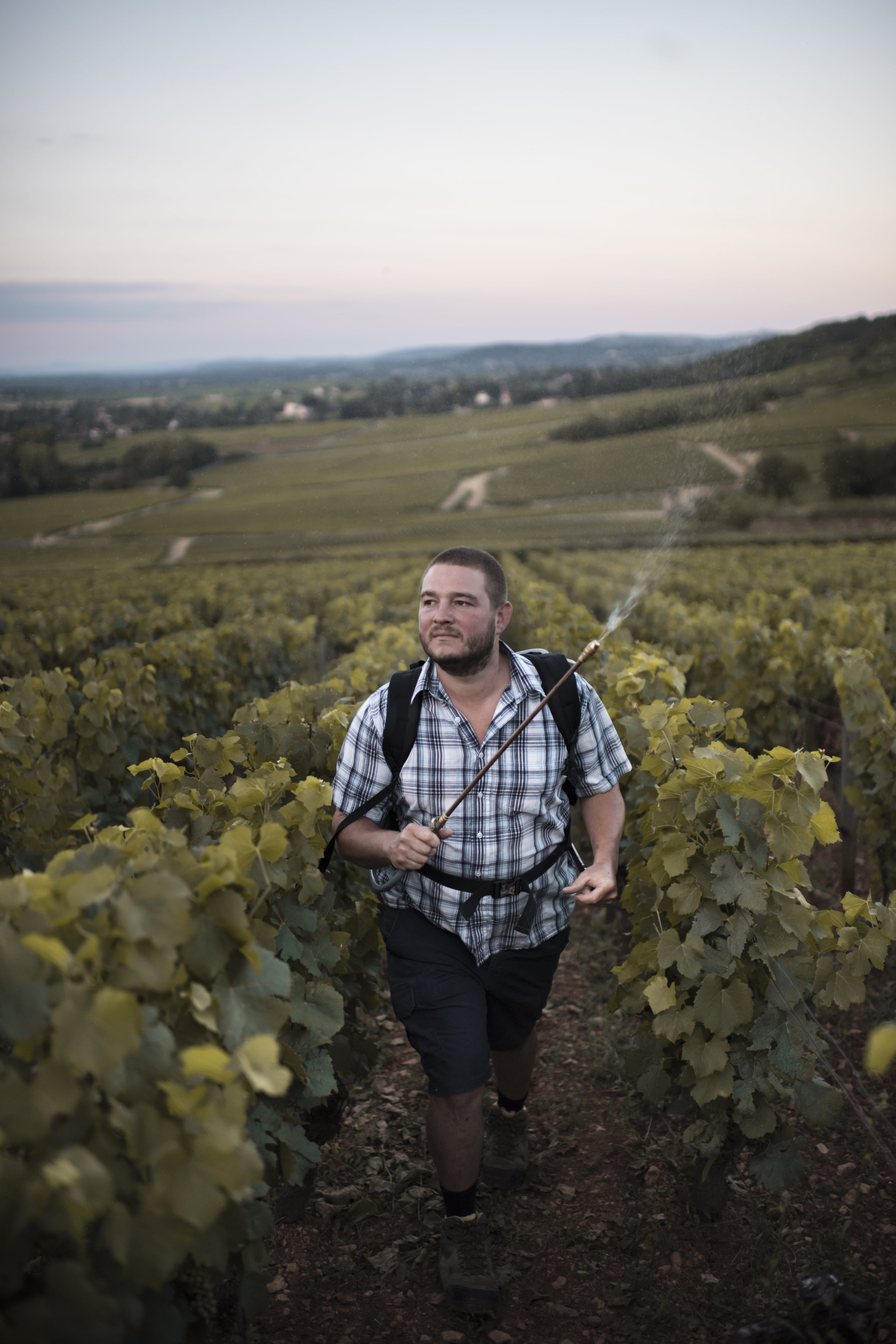
Situated on a hillside above Givry, the estate was founded circa 1130 by the Cistercian monks of La Ferté Abbey. Nearly 900 years later it stands as a witness to the history of Burgundian viticulture. The estate cultivates plots in some of the finest appellations in Burgundy, producing the following wines: Givry Premier Cru Clos du Cellier aux Moines, Mercurey les Margotons, Puligny-Montrachet Premier Cru Les Pucelles, Chassagne-Montrachet Premier Cru Les Chaumées, and Santenay Premier Cru Beauregard.
Since they took over the estate in 2004, Philippe and Christine Pascal have dedicated themselves to making Domaine du Cellier aux Moines one of the key benchmarks for Givry. Here, Cellar Master Guillaume Marko shares his experience as a winemaker.
Le Figaro Vin: How does it feel to be crowned a winemaking champion?
Guillaume Marko: It doesn’t mean a great deal, to be quite honest… What makes me happy is when a taster enjoys drinking my wine and is moved by it.
Have you been training for long?
For 15 years. And I learn something new every day.
Who is your mentor?
Mother Nature – she dictates the tempo. And, of course, my wife who is very patient…
Is wine a team sport?
Not everywhere, but it is with us. And it is so much better that way!
What is the key to making a good wine? The terroir or the winemaker?
The terroir, obviously, although the quality of the vines is of comparable importance. Without the right massal selection you will never get great wine. In a sense the winemaker is the conductor who listens to both these elements and sublimates them.
To what do you owe your success?
To the entire team, present and past, who work with such precision, day after day.
Is your family proud of you?
I hope so.
Your favourite colour?
Red.
The king of grape varieties?
Pinot Noir, obviously!
Your favourite wine?
Clos du Cellier aux Moines Les Dessus Givry Premier Cru.
Your favourite vintage?
2019.
If your wine was a person, who would it be?
It would certainly be me.
What are the best circumstances in which to taste your wine?
You need to remember to open it in advance and then taste it over a meal with friends and family.
Have you ever thought about chemically enhancing yourself, or your wine?
Not for one moment.
For what price would you be prepared to sell your estate?
Make me an offer…only joking!
Who is your strongest competition?
Hailstorms.
Which competitions do you dread the most?
The battle against mildew in years of high rainfall.
What is your greatest trophy?
This one…of course!
What has been your most innovative strategy in the vineyard and in the cellar?
Rediscovering how to listen, how to let go, and let nature take its course.
Who would be your ideal successor on the podium?
It could be any winemaker, provided that he or she gives their soul to the wine.
Second-generation owner and winemaker of her estate in Anjou: “The important thing is to feel alive”.
For the 13th interview in Le Figaro Vin’s series we remain in Savennières in the Loire to meet Tessa Laroche, #38. One of France’s greatest winemakers, hidden away in one of the country’s tiniest appellations, Savennières Roche aux Moines, she will celebrate 20 years at the helm of her estate in 2023.
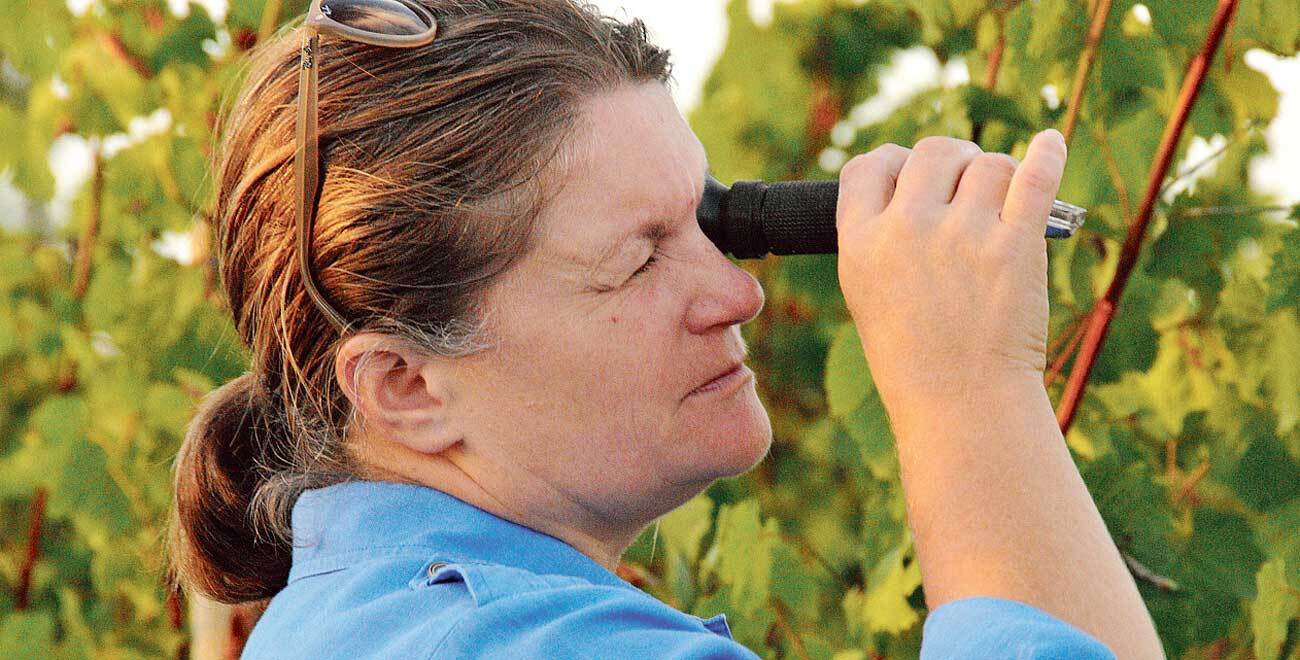
Her parents bought the property, whose wine-growing origins date back to the Middle Ages, in 1981. At that time the wine was still sold in barrels, not bottles. With each passing vintage they succeeded in converting the neighbourhood. Tessa’s mother, Monique Laroche, who passed away in 2020, was the driving force who played a major part in establishing the region’s viticultural reputation.
Her core operation remains the iconic wine of the estate, turning out between 30,000 and 40,000 bottles a year, but in recent years Tessa Laroche has branched out with a new wine, Le Berceau des Fées. This is made from young vines and matured in vats instead of barrels, while her reds, made from Cabernet Franc, display a vivacity rarely found elsewhere. Though her terroir remains her greatest love, not a day goes by without a glass of champagne. As she is fond of pointing out: “The important thing is to feel alive”.
Le Figaro Vin: How does it feel to be crowned a winemaking champion?
Tessa Laroche: I am not a champion, because it is impossible to go it alone. I am just a winemaker. I have a passion, I try to do the best that I possibly can, together with all the colleagues who work with me on the estate.
Who is your mentor?
My mother tops the list, but I would add Odilon de Varine, Charles-Emmanuel Girard, and Richard Leroy (respectively cellar master in Champagne, oenologist in the Loire Valley, and legendary winemaker in Anjou, ed.).
Is wine a team sport?
Yes, without a team you cannot function. There is always a captain, as in any sport or as there is on a ship. The prerequisites are that my team must enjoy food and wine, must have a good sense of humour, and must be happy. The wine we make is good and full of life, so we have to be in harmony!
What is the key to making a good wine? The terroir or the winemaker?
You cannot achieve the necessary level of complexity without the terroir. Without being a megalomaniac, I am lucky to have one of the finest terroirs in existence. That said, all of us are passionate about what we do and, no matter what, our love is reflected in the wine.
To what do you owe your success?
To this wonderful place, and to my parents, who came to establish themselves here. My team has been here for 15 years. Without them I would never have got this far.
The king of grape varieties?
Chenin. It is the best grape variety in the world, with its potential for total success or abject failure. You have to learn how to tame it, growing small yields and small bunches of grapes. But you can have so much fun with it, making sparkling wines, dry wines, sweet wines…you have to know how to manage it, rather like with a horse. If you give it its head it probably won’t be that good. Just now my preference is for dry wines, but the sweet wines are coming back into favour.
Your favourite wine?
Roche aux Moines 2001, my very first wine.
Your favourite vintage?
2019, which I like hugely right now, just like the 2017. But it’s constantly evolving.
If your wine was a person, who would it be?
Just like your dog, your wine takes on your appearance. My wine looks like joie de vivre because I try not to transfer my anxiety to it.
What are the best circumstances in which to taste your wine?
You should be relaxed, at the end of the morning, or after a productive day, sitting in the garden or in front of the fireplace.
Who is your strongest competition in the Loire?
For all of us here Richard Leroy is the master. We even call him God. He is always exchanging ideas, part of the conversation. He loves to share his knowledge. We have to remember that we are all just passing through and it is essential to engage with each other. There is a real solidarity in Anjou, and no one works in isolation. That is probably why the region attracts so many new establishments.
Have you ever thought about chemically enhancing yourself, or your wine?
No, that has never occurred to me. I don’t wear make-up, so why not keep my wine natural too?
Is your family proud of you?
We are siblings and everyone is delighted by the continuity of the estate.
What has been your most innovative strategy in the vineyard and in the cellar?
To get the best grapes depending on the vintage. You have to reinvent yourself every year. However, there is nothing more difficult if you are French!
Who would be your ideal successor on the podium?
God alone knows. I have six nephews and nieces. The choice has to be obvious and, above all, not put pressure on anyone. As things stand, I am in no hurry.
Owner of Domaine Belargus: “I have a bit of a PSG syndrome”.
Figaro Vin’s 39th top French winemaker, Ivan Massonnat creates sumptuous wines on Savennières’ exceptional terroir.
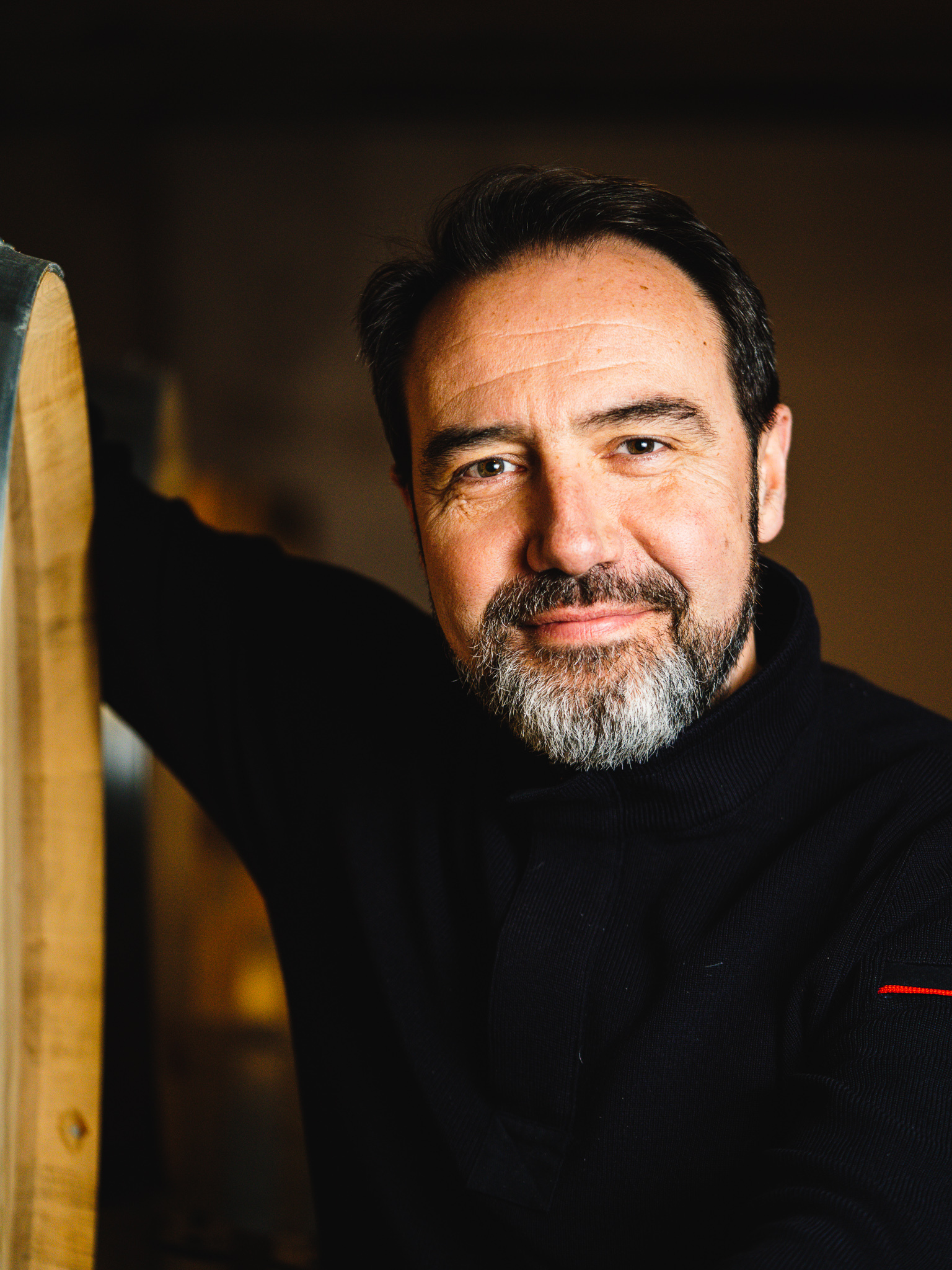
In the Loire valley, on one of Anjou noir’s finest terroirs, Ivan Massonnat is fulfilling his long-lasting dream of producing excellent Chenins from Savennières. At the Belargus estate, born in 2018 with the purchase of the Pithon-Paillé estate, 24 hectares of vines are biodynamically grown in a parcel-based approach inspired by the Burgundian “climates”. Named in tribute to the rare cuvée once made by Jo Pithon – the “Belargus des Treilles” – Belargus is also the name of a small blue butterfly that’s exceedingly rare at this latitude but can be found on the Coteau des Treilles terroir.
Le Figaro Vin. – How does it feel to be crowned a winemaking champion?
Ivan Massonnat. – I don’t consider myself to be a champion. One part of me feels like a wine amateur that’s made it and is living the dream, the other like a producer that makes his wine and takes decisions.
Have you been training for long?
Yes, since my childhood, without even realising it. My passion for vines stems from my grandfather’s vines, and I’ve trained by being in contact with real champions, of the Burgundian kind.
Who is your coach?
Jo Pithon, who’s been by my side every day throughout this adventure, with 40 vintages under his belt. I have a few other mentors, such as Thibault Liger-Belair and Philippe Pacalet in Burgundy. It’s by their side that I learnt to trust myself. There’s Pierre Amoreau from Château Le Puy, who taught me a lot. Among those who inspire me, there’s also Anselme Selosse. His approach goes far beyond that of a winemaker, he’s a true philosopher. At 45 years old, I completely changed my life, shifting towards a career I knew to be difficult. When I see a man like him, I know I’ve done the right thing.
Is wine a team sport?
Yes, definitely. I spend my time saying so. There are some people who are often cast aside, especially in the vineyard, but on my estate, it’s the opposite. You need great talent, with each individual excelling in their specialty. The members of my team are sharp and well-suited to their roles. I have the PSG syndrome; I don’t want people working in silos. If everyone isn’t aware of the whole, we cannot accomplish anything. Good ideas sometimes come from across the playing field. For me, the concept of a rugby team is the best model there is.
What is the key to making a good wine? The terroir or the winemaker?
I have a vision of making wine with a sense of place, and not all places are created equal. That being said, a good-for-nothing from the finest place will not make a great wine! I don’t believe that a winemaker is a magician.
To what or to who do you owe your success?
To all those who believed in me, my closest circle, who didn’t view my project as a pipe dream. There are also those who told my story, as well as the clients. No project can bring people together the way wine does. Each link in the chain has been important. I never imagined things would happen so fast, and the seeds would take root.
Is your family proud of you?
Yes, and very happy for me. My family has made a lot of sacrifices, but it was worth it in the end.
Your favourite colour?
I started with reds, but today I like whites just as much.
The king of grape varieties?
Chenin! It has a lot of character and concentrates a lot of different traits.
Your favourite wine?
The Coteau des Treilles, which I just call Les Treilles.
Your favourite vintage?
Probably 1989, for the reds. It’s the one I’ve had the most opportunities to enjoy.
If your wine were a person, who would they be?
Me. A profound part of a winemaker’s personality finds its way into the wine they make.
What’s the best way to enjoy it?
In good company.
Have you already thought about chemically enhancing yourself, or your wine?
No.
If you had to put a price on your estate, what would it be?
I’m not planning to. This is a 100-year project, and I don’t know what value it will have in a century’s time!
Who is your strongest competition in Anjou?
I don’t view competition that way, nor do I consider my neighbours as opponents. What impresses me is team play. My adversary could be the beer or alcohol-free drinks industries. When I see people with a waning interest in wine, I feel like we’ve missed the boat somewhere along the line.
What has been your most innovative strategy in the vineyard and in the cellar?
My most innovative idea in the region was to break the glass ceiling. What has defined Belargus is the conviction that this region produces some of France’s finest white wines and that they shouldn’t be sold at a discount. It was a risk, but in line with what I was doing. Les Treilles has been the proof of this: a 100 euro-wine from Anjou. This was completely unheard of.
Who would be your ideal successor on the podium?
I don’t know yet. I don’t want to impose this on my children. Nevertheless, one thing is certain: I will not last forever. What will remain is the terroir. My only wish is that my successor be passionate.
Owner and winemaker of Château La Calisse: “You have to be tuned in to your terroir”.
The 11th in Le Figaro Vin’s series brings us back to Provence where Patricia Ortelli, #40, creates her exquisite organic wines. Here she shares her vision and her deep love for her vocation, which she has pursued for the last 30 years. 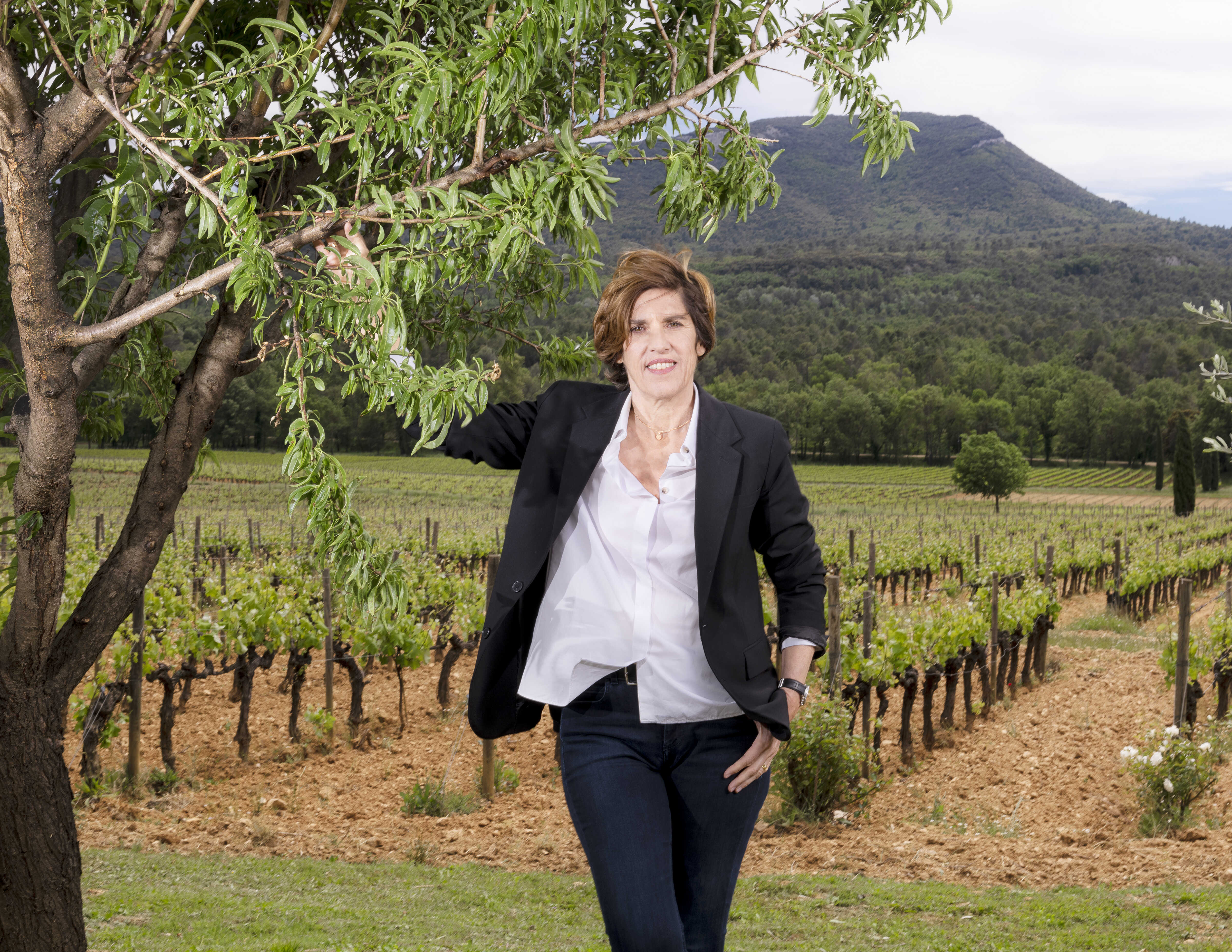
A pioneer of organic viticulture in Provence, Patricia Ortelli works her 12 hectares of vines with passion and respect for the environment, entirely eschewing weedkillers and insecticides. Château La Calisse benefits from an exceptional location, with its terroir of stony limestone soil where the vines flourish at an altitude of 500 metres, which protects them from sun damage. This terroir produces wines of extraordinary vivacity, ranging from a delicate white to a refined red by way of the palest of rosés.
Le Figaro Vin: How does it feel to be crowned a winemaking champion?
Patricia Ortelli: It gives me a feeling of intense happiness, in the light of all the love that, to this very day, I have devoted to my wines.
Have you been training for long?
Only for 30 years! It began when I raised my hand at an auction and ended up owning an abandoned vineyard. We had to start from scratch, completely replanting and rebuilding, levelling the ground and constructing the cellar. That was when I chose to go organic, becoming a trailblazer here in Provence. We started out on land that had never been touched by chemicals.
Who is your mentor?
My oenology professor, who was a big help, and very enthusiastic about this terroir, in the northern part of Provence. This was at a time when investors were focused on the south, in order to be close to the sea, whereas here we are 500 metres above sea-level.
Is wine a team sport?
Yes, one hundred per cent. In my teams we are all on equal terms and we face the day’s challenges together, especially at harvest. One of the joys of this job is that you never know what to expect. You have to stay on your toes. Everyone in my team wants to do their best.
What is the key to making a good wine? The terroir or the winemaker?
For me it’s the terroir, and it is important that the winemaker understands that his task is to respect what his terroir offers. That is my definition of a great winemaker. You have to choose the right path for the wine to express its full aromatic potential, and you have to be tuned in to your terroir to find the best approach.
To what do you owe your success?
To Nature with a capital “N”.
Is your family proud of you?
I am sure they are. They have all been involved in the project and are particularly pleased with the results.
Your favourite colour?
I produce a third of each colour, so I would say a blend of all three. There is a fascination in the specific skills and ways of working required by each of them. My first grapes were white, which went against the prevailing trend. As for the rosé, it is an extremely tricky wine to make, which gives you a great deal of joy when you get it right. Its finesse is remarkable.
The king of grape varieties?
I really think that there is an essential grape variety for each wine. For the whites that is Rolle, for the rosé, Grenache – it is the most suited to our high terroirs – and, for the reds, Syrah and Cabernet Sauvignon. Each grape variety has its own personality, its own challenges, they all have something about them, and you have to discover what makes each of them tick.
Your favourite wine?
The Cuvée Étoiles, but they all bring me a different pleasure. That can be when I am making them or when they are fully realised, just like with a work of art.
Your favourite vintage?
The one which provides the depth, fullness, and freshness that I look for. 2010 for example. Every vintage has a unique character which informs and shapes our wines. But it is certainly the case that the best years are those that are free from disease and frost.
If your wine was a person, who would it be?
It is the image of what nature has given us.
What are the best circumstances in which to taste your wine?
In large glasses, at the right temperature, obviously. But also, ideally, in circumstances conducive to producing a particular pleasure, a sense of joy.
Have you ever thought about chemically enhancing yourself, or your wine?
No product can make a bad grape better. From the moment you harvest fully ripened grapes by hand, through the night, and your grapes are of the finest quality, there is nothing to be gained by tampering with them. The only measures we take are temperature regulation and combinations from different plots, using micro-vinifications, which enable us to balance our wines through blending.
For what price would you be prepared to sell your estate?
There is significant pressure around us, but my estate is priceless. I could never sell it because I am entirely at one with it.
Who is your strongest competition in Provence?
The most formidable competition would be to find myself surrounded by a race to the bottom, considering the terroirs we have in our region. These days Provence has established a reputation for high-quality wine, and we have to maintain it.
What has been your most innovative strategy in the vineyard and in the cellar?
They are too many to count, all connected to my understanding of vines and wine. I use methods that are unique to me, but one of them underpins everything: paying attention. You have to pay careful attention to every aspect of winemaking; you can never relax. I try, every day, to see and understand my vines.
Who would be your ideal successor on the podium?
My son and my grandchildren.









